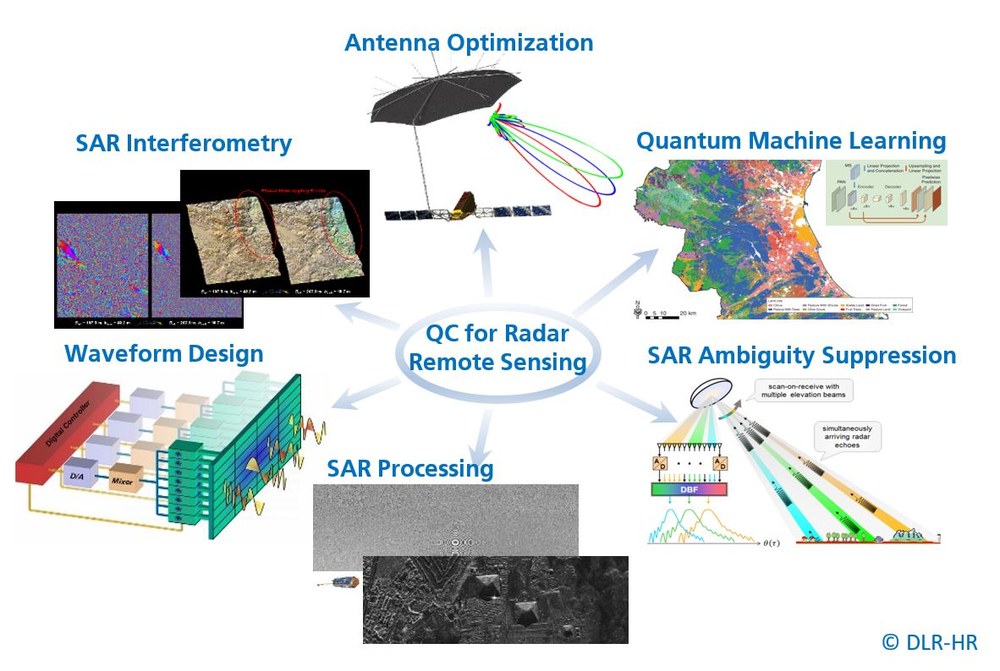QUA-SAR
The QCI-project QUA-SAR aims to combine classic research fields of radar remote sensing - especially synthetic aperture radar (SAR) - with innovative concepts of quantum computation.
Six main application areas have been identified for QUA-SAR: Antenna optimization plays not only an important role in Earth observation but has a large potential for synergy in other related applications such as communications. Also related to the design of modern SAR sensors is the design of advanced radar waveforms which, at its core, can be viewed as optimization problem. The same is true for ambiguity suppression which is essential for high performance SAR acquisitions. On the processing side phase unwrapping is a computationally expensive task in SAR interferometry which benefits greatly from quantum enhanced processing. Also into the category of processing belongs SAR focusing, which stands at the beginning for all higher SAR data product generation. In this context quantum assisted machine learning concepts for SAR feature extraction, classification, detection and tracking will be investigated.
QUA-SAR will research quantum algorithms as a new paradigm for solving complex mathematical problems in order to increase the performance of future radar sensors and accelerate radar data processing.
Challenges
Modern radar remote sensing, for example for Earth observation from space, is playing an increasingly important role in answering essential questions about climate dynamics. While previous space-based radar sensors were able to image the entire surface of the earth twice a year, future radar observatories will provide images of the entire earth's surface up to twice a week and thus make a valuable contribution to climate research.
In future, ever more powerful radar sensors will be needed for earth observation. The core requirements for such radar systems relate to the speed at which radar data can be recorded on the one hand and the data quality on the other. To this end, innovative quantum algorithms are to be developed in order to accelerate the design process of such systems or even make it possible to solve them in the first place.
The second main application of novel quantum computing routines and methods is in the field of radar data processing, ranging from the focusing of raw SAR data to SAR interferometry and the scientific evaluation of SAR images. Here too, unprecedented increases in performance are expected through the use of quantum computers.
Industry Partnership
A central part of this project is to team up with starts-ups and established companies in aerospace, defense and radar technology as well as quantum computing and other related fields. One goal is to promote quantum computational approaches in industrial applications such as advanced processing and enhanced optimization and to empower those companies to put quantum computation to the best use for their product portfolio. It is aimed to raise the application readiness level from level one to level four by the end of the project in fall 2026. Currently, the call is online and bidders are invited for their proposals.

Publications
- S. Huber, K. Glatting, G. Krieger, and A. Moreira, “Quantum Annealing for SAR System Design and Processing,” in 14th European Conference on Synthetic Aperture Radar (EUSAR), 2022, pp. 705–710.
- K. Glatting, J. Meyer, S. Huber, and G. Krieger, “Quantum Optimization for Phase Unwrapping in SAR Interferometry,” in IEEE International Geoscience and Remote Sensing Symposium (IGARSS), 2023.
Patents
- K. Glatting, S. Huber, G. Krieger, “Verfahren und Vorrichtung zur automatischen Ermittlung von optimalen Bi-Phasen-Codes“, German Patent (under review at the DPMA since June 2023).

